The anthropological dimensions of sexuality and the moral challenge of sex education (part 3). Sexuality education: pastoral approach
Main Article Content
Abstract
In the third part of this research, the author concludes from a pastoral perspective his analysis of the moral challenge of sexuality education. Based on criteria such as the appropriate language and the valorization of the norm (guided by the law of graduality and always accompanied by mercy), an education that surpasses mere information is proposed, with educators (mainly the parents, protagonists of this mission, and then teachers and catechists) whose profile is coherent, mature and capable of forming consciences, taking into account age, moments and approach, in a pedagogical style of authority, dialogue, tenderness and testimony.
Article Details

This work is licensed under a Creative Commons Attribution-NonCommercial-NoDerivatives 4.0 International License.
The Creative Commons Attribution (CC BY) license is the most permissive Creative Commons license. It allows others to distribute, remix, adapt, and build upon your work, even for commercial purposes, as long as they give you credit for the original creation.
How to Cite
References
BIZZOTTO, Mario. “Il corpo e il pudore”. In: Camillianum, n. 3, p. 11-33. CANTELMI, Torino. Nati per essere liberi. Famiglia e scuola: educazione sessuale no-gender theory, Roma: Paoline, 2015
CIUCCI GIULIANI Andrea e AL. Parliamo d’amore: educazione all’affettività e alla sessualità. Roma: Carocci Faber, 2006.
CONCILIO VATICANO II. Declaração Gravissimus educationis sobre a educação cristã.
CONSELHO PONTIFÍCIO PARA A FAMÍLIA. Sexualidade humana: verdade e significado. Orientações educativas em família. São Paulo: Paulinas, 1996.
COZZOLI, Mauro. Etica teologale. Fede carità speranza. Milano: San Paolo, 2010. FAGGIONI, Maurizio Pietro. Sessualità matrimonio famiglia. 2ª ed. Bologna: Dehoniano, 2017.
FRANCISCO. Visita apostólica do papa Francisco ao Brasil por ocasião da XXVIII Jornada Mundial da Juventude. Encontro com o episcopado brasileiro (27 de julho de 2013).
______. Exortação apostólica Evangelii Gaudium (24 de novembro de 2013). FROMM, Erich. L’arte di amare. 5ª ed. Milano: Saggiatore, 1972.
LACROIX, Xavier. Présentation du document du conseil pontifical pour la famille. Vérité et signification de la sexualité humaine. Paris: Cerf, 1996.
MACINTYRE, Alasdair. Dopo la virtù. Saggio di teoria morale. Roma: Armando editore, 2009.
MARIA DE LIGÓRIO, Alfonso. A prática do amor de Jesus Cristo. São Paulo: Santuário, 2004.
MAJORANO, Sabatino. “La formazione della coscienza in un contesto fortemente pluralista”. In: Frontiere, n. 8, p. 109-127.
______. “La teologia morale di sant’Alfonso”. In: Rivista di Scienze Religiose, n. 11 (1997), p. 295-308.
______. “Il confessore, pastore ideale nelle opere di sant’Alfonso”. In: Studia Moralia, n. 38 (2000), p. 321-346.
PELIZZARO, Giuseppe. “Un criterio morale per educare la sessualità”. Studia Patavina, n. 60 (2013), p. 75–83.
PONTIFICIO CONSELHO PARA AS COMUNICAÇÕES SOCIAIS. Pornografia e violência nas comunicações sociais. Uma resposta pastoral (7 de maio de 1989).
______. Igreja e Internet (22 de fevereiro de 2002).
POLAINO-LORANTE, Aquilino. Amar el amor humano: algunas aportaciones del pensamiento de Juan Pablo II a la psicologia. Madrid: CEU, 2013.
SAGRADA CONGREGAÇÃO PARA A DOUTRINA DA FÉ. Declaração Persona Humana. Sobre alguns pontos de ética sexual (29 de dezembro de 1975).

